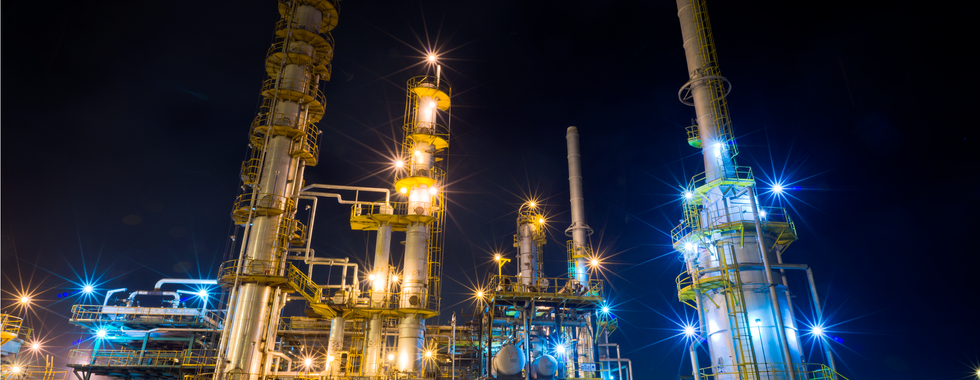PETROPERÚ: on the road to compete globally
- Dec 14, 2020
- 6 min read
Updated: May 16, 2022
Competition in the domestic fuel market thrusts PETROPERÚ toward high efficiency, taking the state-owned subsidiary into becoming not only the most important company in the oil & gas sector, but also nationwide

The oil & gas and energy industries in Peru are highly complex due to the domestic and international competition level and also regarding evolution in standards and production, among other aspects. PETROPERÚ thrives in this scenery, leading the way in imports and fuel markets, becoming the most productive and important company nationwide.
In 2019, PETROPERÚ reached a 44% market share in the liquid fuel market, domestically, earning a US$394 million EBITDA, more than double the amount earned in 2018, reporting a net utility of US$171 million. The company became able to reach such figures by optimizing costs in acquisitions of raw material and other products, besides cutting expenses, among other factors. The company’s contribution to the Peruvian state amounted to US$1,593 million.
PETROPERÚ’s competition has driven the company to take such actions as optimizing its offer at affiliated service stations, as well as a new brand placement.
“As I took my current position, I noticed the company had already entered the tier with heavyweight global players in the domestic market. The company’s economic recovery implies modernization to keep up with such a challenge,” pointed out Carlos Barrientos, CEO for PETROPERÚ.
The right leadership to take on competition from the private sector
Carlos Barrientos took over PETROPERÚ in August 2019. Before being named to the top position in the state’s oil & gas company, he worked in the private sector in industries such as logistics, industrial machinery, as a consultant and other positions which translated into the experience and prestige that took him to the CEO office in PETROPERÚ. Barrientos earned a bachelor’s degree in business administration at the Pontifical Catholic University of Peru, where he also earned an MBA. Other postgraduate degrees for Barrientos include the Leading in Growth and Profitability course from the University of North Carolina Kenan-Flager Business School and taking part in the CEO executive program from the Kellogg School of Management at Northwestern University.
“Being the CEO for PETROPERÚ is one of my highest challenges, professionally, considering it’s the most important company nationwide, which is under constant transformation toward becoming a world class enterprise,” Barrientos commented.
The great challenge of the Talara refinery
The current works at the Talara refinery are more than 90% in route to completion. These efforts are led by contractors Consorcio Cobra and Técnicas Reunidas, both companies share wide international experience in industrial facilities and other refineries.
The Talara refinery, which halted operations from January 2020, once the project entered its final phase before completion, is subject to the following improvements:
• Making the most from raw material. The Talara refinery is about to be introduced to the flexicoking method, a late-generation technology able to turn low-value residues into a environmentally-friendly fuel, thus becoming one of only seven refineries in the world where this process takes place. • Higher capacity. The new Talara refinery relies on 16 processing units and five auxiliary plants, increasing capacity to 95,000 barrels per day, a significant improvement over the 65,000 per day max. produced by the old refinery. • Sustainability and lesser environmental impact. At the new Talara plant -which will be self-sufficient in terms of power supply-, sulfur particles are to be reduced to less than 50 ppm. The removed sulfur will be used to produce sulfuric acid. • Health. Fuel desulfurization is projected to bring a very positive, high impact on the environment, resulting in estimated savings by US$300 million annually in treatment for respiratory diseases among the Peruvian population.
One more benefit brought by the refinery’s location will be the ability to process crude oil extracted from the Peruvian Amazonia, hence becoming more attractive as a recipient for investments in new oil lots, besides making the most out of the North Peruvian Pipeline. “The new refinery possesses strategic value for the oil & gas industry. In the medium term, there’s a possibility of conveying crude oil from Ecuador to be processed in Talara, creating synergies both domestically and abroad,” the CEO added. Reaching the highest global standards is part of the plan of the project to be completed in November 2021. So far there haven’t been any accidents resulting in fatalities or disabilities to any of the near 7,000 individuals involved in this project, working under efficient safety conditions and supported by 190 health professionals on site. World class purveyors for a world class company Operations from PETROPERÚ demand top level resources, such as licensed technology from the most important companies in the industry, worldwide. Banks and specialized companies with international reputation act as consultants for financial matters and social issues are being handled by the company in collaboration with government agencies and speciliazied organizations.
“This kind of support and consultancy wouldn’t be possible if our company didn’t count with skilled staff with enough experience to make the most from the knowledge we obtain from tech, business and social endeavors we are involved with,” Barrientos declared.
Tech support in all fronts Speeding up processes through technology is constantly evolving in PETROPERÚ. Resources like SAP are joined by the virtual desk; management duties are sped up through digital signatures, ramping up procedures which formerly took paperwork and now have become digitized, speeding up interactions with suppliers, clients and citizens, thus supporting integrity, transparency and good corporate governance policies. The company’s processing plants and terminals throughout Peru are also undergoing a digital transformation and the COVID19 pandemic turned telecommuting into a standard for office staff. Counteracting the global pandemic Before 2019, when different factors were taking oil prices into a downward spiral, plans and operations from PETROPERÚ performed above expectations for the year, rising optimism looking ahead to 2020. As COVID19 hit with global quarantines, bringing plenty of economic activity to a halt, the company experienced a 70% drop in sales. Nevertheless, PETROPERÚ stood as an essential activity without any production stoppage, fulfilling every commitment to wholesale clients and service stations. Besides providing its staff of the required consumables to avoid spreading the disease, the company also developed information campaigns and increased medical insurance coverage, guaranteeing attention to COVID19 cases. “All of this has allowed the company to take a crucial role during the first months of the pandemic and also during the country’s economic recovery. This is an achievement for all of us,” the CEO said.
Community and vicinities: refocusing priorities PETROPERÚ’s nationwide presence through refineries, production plants, station services and the North Peruvian Pipeline brings the company closer to different communities with whom the company has established outreach projects. However, the pandemic resulted in the company refocusing its efforts to counterstrike COVID19 in these communities. In Talara, where the refinery is being optimized, the company will donate an entire modular hospital, furnished with the latest technology, including specialized equipment for the disease’s treatment such as ventilators and other breathing aid devices. This facility will be able to host 45 patients, between moderate and critical severity. The hospital is to be run by EsSalud, the healthcare branch for social security in Peru, which is not limited to patients with insurance.
Other donations include bio-security consumables and test kits, besides engaging purveyors and other oil companies to provide corporate contribution. Aid provided during the emergency is an additional effort to the yearly 3,500 medical appointments for vulnerable populations and campaigns to eradicate dengue, Zika virus and chikungunya. In other zones of Talara, Iquitos, Ilo, Pucallpa, Villa Salvador and vicinities of the North Peruvian Pipeline, the company donated non-perishables at the beginning of the pandemic. Other communities such as the Peruvian Amazonas, Loreto and the Datem del Marañón province were benefited with medical attention and other consumables. The company expects to resume previously established programs for community outreach in more than 100 communities neighboring the pipeline as well as in other native communities once the disease is controlled. New horizons within the energy sector PETROPERÚ is on its way to a successful run in lot 64 of the Peruvian oil concessions map. Operations in lot 192 are scheduled to begin in 2021 in partnership with companies in the private sector. Meanwhile, the North Peruvian Pipeline is to undergo a modernization process and upgrades in its infrastructure to keep performing as the most important crude oil transport system, from the rain forests to the Bayovar port terminal. For the long term, PETROPERÚ is exploring possibilities within its current infrastructure to take part in renewable energy, such as wind and solar energy, intending to power its own facilities and partnering afterwards with the purpose of its commercialization. This may undoubtedly result in a masterstroke, considering possible affectations to fossil fuels, in a way that highs or lows in oil price don’t affect the company’s capacity to deliver energy nationwide. On the road to economic recovery After mid-2020, Peru and other markets slowly began the road toward economic recovery. The crude oil price experiences a gradual recovery and PETROPERÚ is resuming projects which had been already underway, such as plant construction in the Ilo, Pasco and Madre de Dios communities, and a signed agreement to export fuel to Bolivia. After the critical stage in Marc, as quarantines worldwide began, from June and onwards sales increased in 65%, projecting a 92% recovery toward the end of 2020. The necessary adjustments saved more than $120 million in capital expenditures and $287 million in operational expenses.
“We are determined to contribute in accelerating economic recovery while keeping strict safety protocols in all our operations. This is what we are committed to as a company and as a nation,” Carlos Barrientos finalized.
DIGITAL GALLERY
PARTNERS
































Comments